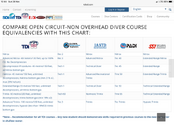Not sure that recreational dive training helps particularly when the technical instructor candidate is properly qualified, i.e. they’ve done many hundreds of significant decompression and trimix dives and can answer what went wrong.But in addition to technical diving experience there's also the teaching element that should not be discounted. I'm a firm believer that anyone that aspires to be a tech instructor should spend some time in the trenches teaching recreational levels first. There is very valuable experience to be gained in managing real students that have very limited diving backgrounds on their first deep dive (30m), or on their first limited visibility dive, or in their first drift dive, etc. Learning the ropes how to work with students in non-decompression / overhead settings, managing the flow of the course, and dealing with real world student problems will only help would-be tech instructors be better prepared when they teach their first tech courses.
I wouldn't trade the experience I personally had teaching recreational levels for anything.
Agreed, some training experience with core skills might be helpful. However, the prospective instructor's own extensive experience is way more important and the actual teaching skills are far more easily developed than the years it took to master their technical diving skills. The "instructor training and development" process including all the mentoring and shadowing would sort that out.
This does assume that technical training agencies do their job properly.
TL;DR
Teaching is far easier to learn than the subject being taught.





